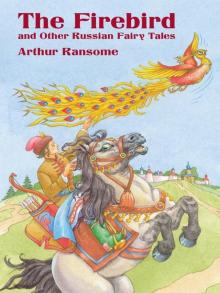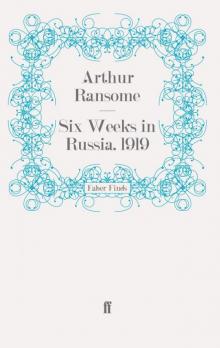- Home
- Arthur Ransome
The Picts and the Martyrs Page 6
The Picts and the Martyrs Read online
Page 6
“Come in and look at our house,” said Dorothea, able to breathe once more.
“I’ve brought you the apple pie they had to their suppers. They didn’t eat much. Happen it’ll put you on a bit …”
‘Thank you very much. Has she really come? We thought we heard the motor car but we couldn’t be sure.”
“Aye, she’s come,” said Cook grimly. “She’s come, and trouble with her. Girt auld hen ’at wants to be cock o’t’ midden. She’s begun by clearing Miss Nancy off from the head of the table and taking the mistress’s place herself. And I’d put Miss Nancy’s napkin ring there, so there could be no mistake. And it isn’t as if Miss Nancy’s the little lass she was.”
“What did she say?” asked Dorothea.
“Miss Nancy? I couldn’t have believed it. ‘Cook,’ she says, ‘Aunt Maria likes that end of the table better. And she’s the visitor so she must choose. Peggy and I’ll sit one each side of her.’ Miss Turner looked at her a bit flummoxed, but she didn’t oppen her gob … I mean, she didn’t say nowt about it, and after that Miss Nancy was saying how she hoped the weather would keep fine for her visit, and Miss Peggy chipped in asking if she liked sitting facing the engine in the train or the other way and did she have a corner seat?”
Cook was looking this way and that round the inside of the hut. “Not but what it’s better’n I thought,” she said. “But there’s Mrs Blackett trusted me to look after you, and here’s two of you gone already. Miss Nancy does fair rush a body off their feet. Not but what Miss Turner wouldn’t be letting her tongue off if she knew you were staying at Beckfoot with the mistress away. But it’ll be worse if she finds out now, and how we’ll keep it from her, I don’t know. There’s one thing. You’ve a roof over your heads … not but what it could do with patching …”
“Will you have a cup of tea?” said Dorothea. “I can make one in a minute.”
“Not I,” said Cook hurriedly. “Thank you kindly, but I must away down. I had to run up to see where Miss Nancy’d put you before I could be easy in my mind. Not that I’m that easy now. But it’s better’n I thought. Nay, nay, I mustn’t stop. Miss Turner’ll be ringing that bell, and no one to answer it … Not but what no one can say I haven’t as much right as other folk to put my nose out of doors.”
“What are they doing now?” asked Dorothea.
“When I slipped out they were sitting in the drawing-room,” said Cook. “Good thing I dusted that piano. Miss Turner run her finger over it first thing.”
They went down with her as far as the road. Somehow, old Cook, stumbling down that rocky path and grumbling at the branches that met across it, made Dorothea feel that they were not yet altogether out of touch with Beckfoot.
By the gap into the road they stopped, and waited there while Cook hurried away in the dusk.
“Listen,” said Dick suddenly.
In the quiet evening they could hear the faint tinkling of the Beckfoot piano.
“Let’s go a bit nearer,” said Dorothea. “If they’re all in there it’s quite safe.”
They tiptoed along the road and waited opposite the house. The noise of the piano came clearly through the trees.
“That’s the third time she’s got stuck,” whispered Dorothea. “It must be awful for the one who isn’t playing, just sitting there and watching the Great Aunt’s face.”
“There she goes again,” said Dick.
“It isn’t Nancy’s sort of tune,” said Dorothea. “She’s quite all right with one finger doing that pirate song of Captain Flint’s.”
“Let’s go home,” said Dick suddenly. “I want to have another go at the sailing book. Scarab’s going to be ready the day after tomorrow.”
They tiptoed away round the bend in the road and began to climb once more up into the wood. Dorothea felt suddenly very much alone. Dick was there, of course, but with his mind on the new boat, or on birds, or on cutting up wood in a scientific way, he did not seem to realize that they were going to sleep in a hut in the wood with nobody in it but themselves, a hut with holes in its roof and no glass in its windows. Dorothea did not know which was worse, to think of it as a hut in which for perhaps twenty years no one had lived, or to think of it as a house from which in the middle of the night they might be turned out by the rightful owner coming home. It was not at all like sleeping in a tent in camp with other friendly tents close by.
The first call of an owl sounded in the valley.
“There’s that tawny owl again,” said Dick. “I heard him last night, but I’m not putting him down on my list till I’ve seen him.”
Of course it was all right, thought Dorothea. The ghostly wood all round them was only full of natural history. And Dick knew all about that. All the same … “Alone in the Forest” by Dorothea Callum. She started violently as a couple of woodpigeons clattered out of the branches of a tree close to the path.
“Roosting already,” said Dick.
Back in the hut, Dick lit the hurricane lantern and took his sailing book from the shelf over the fireplace. Dorothea divided the rugs and laid them in the hammocks. There were three for each of them.
“There aren’t any pillows,” she said.
“Knapsacks,” said Dick. “With clothes in them.”
Dorothea shut the door and put more wood on the fire. “We’d better be too hot than too cold the first night. And with no glass the window’s open anyway.” The sticks flamed up and shadows flickered over the walls except for the square gap where there should have been glass. Through it she could see the dim shapes of trees and a patch of sky on which were the first stars. Dick was already sitting on the three-legged stool, reading as much by firelight as by the light of the lantern.
“Let’s put the light out and go to bed,” said Dorothea.
“Just one chapter,” said Dick.
He read steadily on about the theory of sailing till he heard Dorothea again. “Much better go to bed. There’s all tomorrow.”
He looked round and saw Dorothea looking down over the edge of her hammock.
“I say. You got in jolly quietly.”
“It was easier than I thought. Dick, I do believe it’s going to be all right.”
“Why shouldn’t it be?” said Dick.
Five minutes later he too had worked himself into his hammock, had put his torch and his spectacles in a safe place on the top of the beam above his head, had folded his rugs over himself and was trying to find a soft place in his knapsack.
“It’s rather like being a caterpillar,” Dorothea heard him say.
“What?”
“Lying in a hammock. Really it would be better to be a caterpillar, because they’ve got joints all the way along.”
Dorothea, lying in her hammock, very tired and already half asleep, was feeling much better about things. They had had their first meal. They had gone to bed. The Great Aunt had not found out about them and come raging up to bring them back to Beckfoot. No other Pict had come to turn them from his home. They had only to go on like that and all would be well. It was Dick and not Dorothea who thought of a new danger ahead.
He had been lying there, thinking of Scarab and of all they had planned to do. Suddenly he started up.
“Dot. We’ve forgotten something. Timothy’s coming tomorrow to take us to the mine. As soon as he comes to Beckfoot he’ll ask where we are.”
“Nancy’s sure to have thought of that,” said Dorothea.
“Listen. Listen,” said Dick a moment later. “There’s that tawny owl again.”
“I heard it.” Dorothea’s voice was muffled by the rug she had pulled over her head. The owl, heard from the hut in the wood, was nothing like so friendly and holiday a sound as it had been when heard from the spare room at Beckfoot. And the thought of Timothy, though she had told Dick that Nancy would have remembered about him, kept her lying awake long after Dick had gone rather uncomfortably to sleep. If Timothy was going to walk into Beckfoot and blurt out the whole secret first thing in the morning it would
have been better, far better, if they had never turned into Picts.
CHAPTER VII
SECONDHAND NEWS
DOROTHEA was waked by the squawk of a cock pheasant in the wood. There was a feeling of stiffness in her back. Her bed seemed to have sagged in the middle. She opened her eyes and saw that the high ceiling of the spare room had dropped and turned into a dark oak beam. And the skull and crossbones from the head of her bed had gone. And what had happened to the wallpaper? No. There was the skull and crossbones, fastened against a stone wall. She remembered where she was and looked out past her feet through a great hole in the wall to green leaves and the trunks of trees. That tinkling noise was water dripping down into one of the little pools of the beck.
She remembered everything now. The Great Aunt of whom everybody was so much afraid was sleeping in that spare-room bed where she herself had slept the night before. Life at Beckfoot was going on without herself or Dick. It was as if they had slipped through a hole in the floor. They had fallen out of that life into another, in which, for the first time, she, Dorothea, had a house of her own. Nobody was going to say, “Buck up, Dot. Breakfast’s nearly ready.” If there was going to be any breakfast, she ought to be getting it now. She looked across at the other hammock. Dick was still asleep. Getting down was not going to be too easy. She pulled loose the edges of the rugs that she had tucked in under herself, swung her legs over the side, felt for the chair and kicked it over, held firmly to the hammock, kicked again, let herself slide and found herself standing on the earthen floor.
She put on her sandshoes, took soap, toothbrush, towel and kettle, opened the door and went out into the morning sunshine. There was that pheasant again. And now a new noise, the tap, tap of a hammer on a tree-trunk. For a moment Dorothea stood still, listening, half thinking that there might be someone working in the wood. Then she remembered that she had heard that noise before, last summer, in the woods below High Topps, and Dick had told her what it was. A woodpecker. No. There was nobody about. She and Dick were the only people in the world. And Dick was asleep. She had the world to herself.
She filled the kettle at the pool in the beck, washed her face and hands and cleaned her teeth. She thought of a new name for a story. “Ten Thousand Years Ago … a Romance of the Past,” by Dorothea Callum. No. No. With breakfast to get, this was no time to think of stories. She gave her face a last towelling, took the plates and mugs and spoons from under the waterfall and set off back to the hut to light the fire. As she came out into the clearing she saw a wisp of blue smoke above the huge old chimney. The smoke thickened and climbed straight up in the still air. And there was Dick, in his pyjamas, coming out to look for her.
“Hullo, Dot. Why didn’t you wake me?”
“I’ve only been to wash and fill the kettle. I say, you’d better wash, too, and get dressed. What have you been doing to your face?”
“I started the fire with some of the sticks that hadn’t burnt away last night. Some of them were almost charcoal. And then I went and rubbed my eyes by mistake.”
“Here’s the soap and towel. Get your toothbrush. Take your clothes with you.”
“All right. I only used one match for the fire. Dry bark makes splendid stuff to start it.”
“Good. Hurry up and get dressed and I’ll have breakfast ready by the time you come back.”
Dorothea put the kettle on, dressed in two minutes and was laying plates and mugs on the sugar case that was the Picts’ table before she remembered that they had used the last of the milk the night before. That meant no cornflakes and milk as usual. And no tea. “Oh bother,” thought Dorothea.
“I ought to have kept some from yesterday and kept it in a cool place.” Housekeeping was not as simple as people thought who had other people to do it.
Dick came back dressed, looking a different colour with the charcoal washed from his face and hands.
“No milk,” said Dorothea. “Not till one of them comes. I expect they’ll bring it.”
“Let’s be all ready before they come,” said Dick. “They may want us to do something about stopping Timothy. If they go out in the boat and we go along the road …”
“Oh, I say,” said Dorothea. “I’d forgotten Timothy. We won’t wait for milk. We’ll be all right with cocoa. It says on the tin it’s cocoa, sugar and milk all in one. It only needs hot water. And we can have eggs and bread and butter and there’s a pot of marmalade.”
“There’s all that apple pie,” said Dick. “We can eat it out of the dish and it won’t be so sticky to wash up.”
The woodpecker spoilt the eggs for them. Dorothea had put them in the saucepan of boiling water and pushed it in at the side of the fire. She was hard at work stirring the cocoa first in one mug and then in the other and Dick was timing the egg-boiling with his watch, when he heard that tap, tap, close outside the hut. “A minute and a half gone,” he said. “I’m sure that’s a woodpecker … Two minutes …” He moved quietly, watch in hand, to the doorway. The tapping seemed to come from a tree behind the hut … Dorothea added more water and went on stirring, wondering if breakfast was over at Beckfoot and how soon one or other or perhaps both the martyrs would escape and come racing up through the wood. “It must be four minutes now,” she thought, and was not at all sure whether Susan boiled eggs for four minutes or for three. “Dick,” she called. There was no answer. She went out and could not see him. “Dick!”
“He’s gone. But I saw him all right. Great Spotted. Black and white with a red patch.” Dick slipped his watch back into the breast pocket of his shirt and pulled out his notebook.
“But the eggs,” said Dorothea.
He looked at his watch again. “I can’t remember where the minute hand was when we started. I’m awfully sorry.”
She darted back into the hut and took the eggs out with a spoon. “I expect they’re ready now,” she said.
The eggs when opened were as hard as bullets.
“Perhaps even four minutes is too much,” said Dorothea.
“They may have been in much more than that.”
“They make an awful mess when they’re runny.”
“These aren’t runny, anyway,” said Dick.
“Hard-boiled,” said Dorothea.
“Steel-boiled,” said Dick. “My fault, watching the woodpecker.”
They washed the eggs and bread and butter down with the cocoa, but were glad to get to the last course – the Beckfoot apple pie. It had been baked in a deep oval dish, with an egg-cup upside down in the middle of it to keep the pastry from sagging down. Yesterday, in the Beckfoot dining-room, the Great Aunt had opened it carefully with a knife and served small slices from it for Nancy, Peggy and herself. Dick and Dorothea, with the pie-dish between them, set to work at opposite sides of the neat three-cornered hole she had left. They could have finished it, but kept a little for dinner in the middle of the day.
“It’s just the thing after eggs and cocoa,” said Dorothea. “Cool and wet and not sticky at all.”
*
They washed up by the beck, with a kettleful of hot water that made things much easier. They rolled up their rugs, unslung the hammocks and hung them against the wall. They decided to put no more wood on the fire and to light it again in the evening. Every now and then they listened for footsteps coming up through the wood.
“I wonder why they don’t come,” said Dick.
“Perhaps they have breakfast later with the Great Aunt here.”
“It’ll be too late to do anything about Timothy now.”
Dick sawed and broke up a lot more of the firewood they had cleared out of the hut. Dorothea made a neat pile of them at the side of the fireplace. There was no sign of either of the martyrs from Beckfoot.
“It’s a good thing we didn’t wait for the milk,” said Dick.
“Let’s go down and wait for them at the bottom of the wood,” said Dorothea.
They had left the coppice and were going cautiously down through the larches when they heard a r
attle. A man got heavily off his bicycle by the gap into the road. He had come so suddenly that he was already looking up the path at them before they had time to dodge back out of sight. He swung a bag round from his shoulder, put his hand into it and brought out a letter.
“It’s the postman,” said Dorothea. “If he’s been to Beckfoot with a letter for us we’re done.”
“I’ve a letter for you,” said the postman. “Addressed to Beckfoot. Miss Turner at Beckfoot wouldn’t take it. She wrote on it too.” He gave Dorothea the letter, and on it, pencilled in a clear sloping hand were the words “Not known here.”
“It’s from Mother,” said Dick.
“You didn’t say you’d seen us yesterday?” asked Dorothea.
“It was on the tip of my tongue,” said the postman. “But I saw Miss Nancy. She was there making faces at me, and I could see she meant me to say nowt. So I said nowt, and took the letter. Least said soonest mended I thought to myself. ‘Not known?’ All right. Take it back to the Post Office.”
“But …”
“I’d nobbut got back to my bike when a stone come by my ear as near as nothing, and there was that young limb beckoning at me over the garden wall. She’s a terror, Miss Nancy. ‘About that letter,’ she says. ‘And whatever you do don’t bring any more letters for them to the front door.’ ‘But Miss Turner says they’re not here,’ says I. ‘They are here,’ she says, ‘but Aunt Maria mustn’t know. Mother knows they’re here. She invited them. But Aunt Maria doesn’t.’ And then she says where you was at, and she says I’d better bring you the letter to make sure. ‘What if Miss Turner asks me what I’ve done with it? There’ll likely be trouble for me,’ I says, ‘if I do as you say.’ ‘There’ll be much worse trouble for us if you don’t,’ says Miss Nancy. ‘And don’t you talk so loud. And there’ll be much worse trouble for Mother. That’s why they’ve gone. You ask Cook,’ she says. ‘Well, I’ve had trouble with Miss Turner myself,’ I says. ‘I’ll take them the letter. But you’ll have to clear me if there’s questions asked.’ ‘There won’t be,’ says she. Here’s your letter. But what am I to do if there are any more?”

 Peter Duck: A Treasure Hunt in the Caribbees
Peter Duck: A Treasure Hunt in the Caribbees Racundra's First Cruise
Racundra's First Cruise Great Northern?
Great Northern? Swallowdale
Swallowdale Swallows and Amazons
Swallows and Amazons Winter Holiday
Winter Holiday Missee Lee: The Swallows and Amazons in the China Seas
Missee Lee: The Swallows and Amazons in the China Seas Pigeon Post
Pigeon Post We Didn't Mean to Go to Sea
We Didn't Mean to Go to Sea The Firebird and Other Russian Fairy Tales
The Firebird and Other Russian Fairy Tales Coot Club
Coot Club The Big Six: A Novel
The Big Six: A Novel Six Weeks in Russia, 1919
Six Weeks in Russia, 1919 Secret Water
Secret Water The Big Six
The Big Six Missee Lee
Missee Lee Peter Duck
Peter Duck The Picts and the Martyrs
The Picts and the Martyrs